Embracing Our Emotions and Managing Triggers: A Path to Personal Growth
In the whirlwind of life’s ups and downs, our emotions act as our steadfast guides, shaping not just our reactions but our entire journey. Far from being mere fleeting states, emotions play a critical role in our survival, productivity, and personal growth. They’re not just feelings that pass like a breeze; they serve multiple purposes that add depth and color to our lives.
Take joy, for example. It lets us bask in the beauty of life, savoring simple moments like a stunning sunrise or the infectious laughter of loved ones. Happiness, in turn, acts as a powerful motivator, boosting our satisfaction with every experience. Beyond personal fulfillment, emotions are vital for communication and connection. A shared smile or a warm embrace can communicate volumes, creating bonds that last a lifetime.
However, emotions also have a profound impact on how we navigate life's challenges. When faced with adversity, anger can drive us to confront injustice, while fear acts as a protective instinct, steering us away from potential dangers. These responses, while adaptive, can also become overwhelming when triggered unexpectedly.
Understanding and Managing Emotional Triggers
Triggers are those seemingly small events—like a comment, a memory, or even a smell—that set off intense emotional reactions. Managing these triggers is essential for maintaining our emotional well-being and navigating life with resilience and clarity. Here’s a practical approach to understanding and managing your triggers more effectively:
Identify Your Triggers
Start by reflecting on situations, people, or environments that consistently provoke strong emotional reactions. Journaling can be a valuable tool here. Write down your feelings and the context in which they occur. Over time, you’ll begin to notice patterns that can help you pinpoint specific triggers.
Understand the Root Cause
Triggers often stem from past experiences, unresolved trauma, or deep-seated fears. Once you've identified your triggers, explore why they affect you so strongly. What’s the story behind the trigger? Understanding the root cause allows you to approach these situations with empathy for yourself, which is crucial for healing and growth.
Develop Coping Strategies
With a clearer understanding of your triggers, create a toolbox of coping strategies. This could include deep breathing exercises, grounding techniques, or positive affirmations to calm your mind and body in moments of stress. Physical activities like walking, running, or yoga can also help release tension and refocus your mind.
Practice Mindfulness and Self-Awareness
Mindfulness is a powerful tool for managing triggers. Practice being present and observing your thoughts and feelings without judgment. When you feel triggered, take a step back and recognize the emotion as it arises. Acknowledge it, but don’t let it control you. Over time, mindfulness can help you respond to triggers more intentionally.
Set Healthy Boundaries
If certain people or environments frequently trigger you, it may be necessary to set boundaries. This could mean limiting time spent with certain individuals, avoiding specific topics, or removing yourself from situations that are consistently harmful. Remember, prioritizing your mental health is not selfish—it's essential.
Reframe Your Thoughts
Cognitive reframing involves changing how you think about a situation. When faced with a trigger, challenge any negative thoughts that arise. Ask yourself if there’s another way to interpret the situation. By shifting your perspective, you can reduce the emotional impact of triggers and gain greater control over your reactions.
Leverage Technology for Self-Awareness
In today’s digital age, technology provides innovative tools like emotion-tracking apps to enhance self-awareness. These apps analyze your emotional patterns over time, offering insights into recurring triggers and behaviors. With this knowledge, you can proactively shape your emotional responses, fostering a deeper sense of control and well-being.
Create a Self-Care Routine
Regular self-care is a crucial component of resilience. Make time for activities that nurture your mind, body, and soul—whether it’s meditation, exercise, reading, or spending time in nature. A strong self-care routine helps you stay grounded and better equipped to handle emotional challenges.
Seek Professional Help When Needed
Sometimes, triggers are tied to deep-rooted issues that are difficult to manage alone. A therapist or counselor can help you explore the underlying causes of your triggers and develop effective strategies for managing them. Cognitive-behavioral therapy (CBT) is particularly effective in helping individuals reframe negative thoughts and behaviors.
Be Patient with Yourself
Remember, managing triggers is a journey, not a destination. It takes time, practice, and patience to understand and cope with them effectively. Celebrate small victories and recognize that setbacks are a normal part of growth. By being kind to yourself, you’ll build resilience and a more balanced emotional life.
Embracing Emotions: The Gateway to Growth
Ultimately, embracing our emotions—both the joyous and the challenging—allows us to embrace life itself in all its complexities. By harnessing the power of our emotions, we can navigate life's turbulence with purpose and forge a path toward personal growth, resilience, and fulfillment. Each emotion, from the thrill of success to the solemnity of loss, serves as a compass guiding us toward a more authentic and meaningful existence.
So, don’t see emotions as mere disruptions or distractions. Instead, recognize them as invaluable allies, teaching us about ourselves and helping us grow. With mindful awareness and effective strategies, we can manage our triggers, understand our emotional landscape, and live a richer, more fulfilling life.





